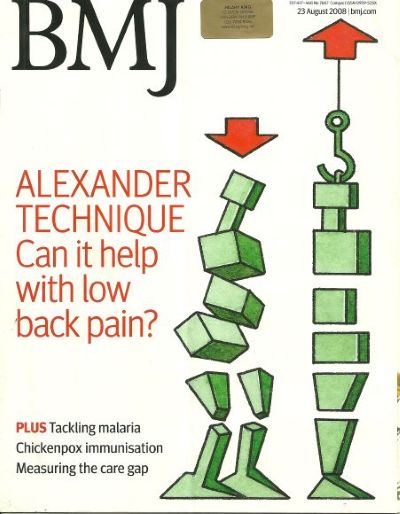Is there any Alexander Technique Scientific Research?
Many people are beginning to ask this and yes, there is. These days, more people expect scientific credibility, not word of mouth recommendations and referrals. Published scientific research into the Alexander Technique has increased greatly over recent years. Anecdotal reports that the AT can help a wide range of conditions are at last being supported by scientific evidence. Once this happens, bodies such as the NHS are more willing to acknowledge the Technique as being bona fide and a useful resource. This is really good news for anyone wanting to know about the effectiveness of taking Alexander lessons.
I mention some of the larger Alexander Technique scientific research projects here and will add to this as new research is published.
STAT Research Group
Gradually, a body of Alexander Technique scientific research is being built up, both in the UK and internationally. The Society of Teachers of the Alexander Technique, STAT, has a dedicated Research Group which promotes new research and disseminates existing research.
I only mention some larger research projects here but there are many more studies on topics such as balance, ergonomic skills, musical performance, postural tone and wellbeing. These are listed on the STAT website, and Alexander Studies Online.
The First Major Study – ATEAM Research Trial into Back Pain
The first major scientific paper was published in the BMJ by the ATEAM Research Trial which was funded by the Medical Research Council and the NHS Research & Development Fund
This compared three treatments for chronic backpain: Massage, Exercise and the Alexander Technique. Gratifyingly, the greatest improvement was shown in the subjects who had Alexander lessons. This study led the NHS to being prepared to state that ‘lessons in the technique may lead to reduced back pain-associated disability and reduce how often you feel pain for up to a year or more‘. I was pleased to be one of the participating teachers in this research and you can read more about it in my article here.

BMJ 2008;337:a884 2008
Alexander Technique and Idiopathic Parkinson’s Research
Another randomised controlled trial recognised by the NHS, shows that the Alexander Technique is likely to lead to a sustained benefit to people disabled by idiopathic Parkinson’s disease. This study was funded by STAT
Additionally, the trial provided evidence that the Alexander Technique group was comparatively less depressed post-intervention, on the Beck Depression Inventory, and at six-month follow-up had improved on the Attitudes to Self Scale.
Randomized controlled trial of the Alexander Technique for idiopathic Parkinson’s disease.
Volume 16, Issue 7 2002.
The NHS website says ‘there is evidence that…. lessons in the (Alexander) technique may help you carry out everyday tasks more easily and improve how you feel about your condition‘. This is certainly born out in the article written by one of my AT pupils who has Parkinson’s.
The NICE guidelines also suggests that medical professionals ‘Consider the Alexander Technique for people with Parkinson’s disease who are experiencing balance or motor function problems’.
ATLAS Research Trial for People with Chronic Neck Pain
This large clinical trial has been followed by smaller studies and papers evaluating the use of the Alexander Technique for helping people with chronic neck pain. The trial was funded by Arthritis Research UK.
The results of the ATLAS Trial provides evidence that Alexander Technique and acupuncture can be effective long-term treatments for chronic neck pain. Participants who had AT lessons had improvements in pain levels and associated disability, plus developed greater self-care and self-efficacy skills., compared to the usual care alone.
The NHS states that ‘lessons in the technique may lead to reduced neck pain and associated disability for up to a year or more’
European Journal of Integrative Medicine Volume 17, January 2018, Pages 64-71
Alexander Technique Science
This is an important group of UK and US scientists and Alexander teachers who promote ‘Peer-reviewed Research on Mind, Movement, and Posture’.
Their website is devoted to ‘improving scientific understanding of the Alexander Technique, its principles, practices, reported and demonstrated benefits, and terminology.’ The research fields relevant to the Alexander Technique that they develop, focus on the areas of Motor Control, Biomechanics, Neuroscience and Psychology. Their research has been published in various scientific journals.

‘Several disciplines are relevant to Alexander Technique, with motor control being the most relevant’ Alexander Technique Science
Alexander Technique Science also runs courses in order to develop understanding, discussion and international collaboration on scientific research into the Alexander Technique.